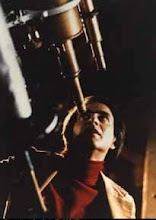 Cosmos, the very word evokes the entirety of all existence and a sense of wonder. “The cosmos is all there is, all there ever was, and all there ever will be”. These opening lines of Carl Sagan’s book and landmark television series introduced us to the concept of science as a spiritual enterprise - the quest to understand who we are and where we stand in the vast scheme of the universe.
Cosmos, the very word evokes the entirety of all existence and a sense of wonder. “The cosmos is all there is, all there ever was, and all there ever will be”. These opening lines of Carl Sagan’s book and landmark television series introduced us to the concept of science as a spiritual enterprise - the quest to understand who we are and where we stand in the vast scheme of the universe.We live between two great gulfs within the very fabric of the cosmos- the immensity of space and an eternity of time. Yet, through the miracle of special effects and a starship of the imagination, Carl Sagan went boldly forth where few had gone before and took us with him on a personal voyage of discovery through those very gulfs. It was a voyage that traversed the galaxies and the vast ocean of time and space. This epic voyage began from the very shores of our planet out into the cosmic ocean. It was a journey that was also a homecoming to lay claim to our cosmic inheritance into the very realm from which we can trace our beginnings.
The science of our age has revealed to us a universe some fifteen billion years old, where the very matter of the cosmos came to life on our island Earth four billion years ago, and star stuff started contemplating the stars with the emergence of intelligence and civilization fifty thousand years ago. With civilization came science and through much trial and error we finally live in an epoch where the tools and methods of science allow us to make it a spiritual quest where we can, more than any previous generation, hope to answer the seven mystical questions of our age:
- How did the Cosmos come into being and how will it end?
- What is space?
- What is time?
- What is gravity?
- What are the fundamental nature of matter and energy?
- How did matter emerge into life and consciousness?
- Do we share the cosmos with other creatures that seek to
answer these questions and others that our imagination and intelligence have not even begun to contemplate?
Carl Sagan’s Cosmos was for many of us the first epic voyage of exploration where we sort answers to these questions outside the realm of comic books, science fiction, or Star Trek.
Cosmos presented the whole of the scientific enterprise as a very human pursuit. For a very long time we have looked at science as something outside the realm of everyday human concern. We glorify art, literature, and music. But, look at science as a separate endeavor outside the human norm. In fact we should expand the definition of the humanities to encompass science. Science can trace its origins to its metaphysical beginnings in ancient Ionia. The wellsprings of some of our deepest questions were once the chief concerns of religion and philosophy. Yet, science, with a capital “S” is a human endeavor that resonates with our deepest yearnings to understand the reason and purpose of our existence. To quote Carl Sagan “Science is not only compatible with spirituality; it is a profound source of spirituality”. Science has its own poetry and psalms that glorify the wonders of the cosmos. Science uses its own language to write sonatas of praise to the numinous, the language of discovery known as mathematics.
Cosmos was also a major source of inspiration for many teenagers to pursue a career in science, and for me personally, a career as a science teacher. Often as I prepare my lesson plans or a public presentation, I can hear Sagan whispering to me “can’t you make it more interesting”? or “where is the poetry to evoke awe and wonder”? We need to inject that sense of wonder and awe back into our teaching. The discoveries of science and the language of discovery mathematics should be presented with the same spirit as Cosmos presented the wonders of creation to the general public. Our classrooms must become the starships of the imagination that transcend space and time to inspire a new generation of scientists and engineers to take us on new voyages of discovery.
The following video clip shows the opening introduction of the first episode of Cosmos: The Shores of the Cosmic Ocean.

No comments:
Post a Comment